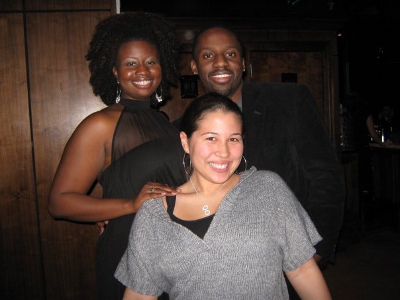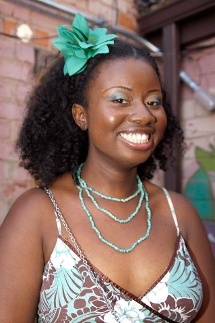One of a Kind
A Computer Science alumna becomes the first African-American woman in history to get a Ph.D. in Computer Science from the University of Michigan.
That’s how Kyla McMullen (CS, B.S. ’05) describes what it feels like to be the first African American woman at the University of Michigan to graduate with a Ph.D. in Computer Science.
“I don’t think there’s anything special about me,” says Kyla with a modest laugh. She explains that while it’s nice to be recognized as a “first”, her accomplishment points out a sad reality: not enough women and minorities are pursuing advanced degrees in Computer Science. Out of the more than 1,400 Americans who received Ph.Ds in Computer Science from 2010-2011, less than a quarter were female, and a mere 1.2 % (or 16 people) were African American, according to the latest Computing Research Association (CRA) Taulbee Survey. It’s a good thing staggering statistics like that didn’t deter Kyla.
Kyla’s passion for Computer Science started early and was nurtured throughout High School. “When I was little, I always liked gadgets,” she says. She remembers being fascinated by her family’s first computer because it seemed like magic. She admits to staying up all night, clicking through file folders, trying to figure out how it worked. Luckily for Kyla, her high school in her hometown of Oxon Hill Maryland had a special Computer Science track. This meant exposure to curriculum that most high schools lack, and the opportunity to take courses in Computer Programming and Engineering early on.
It paid off. One day, Kyla was sitting in Calculus class when the guidance counselor called her to his office. She thought she was in trouble, but he actually wanted to recommend that she apply for UMBC’s Meyerhoff Scholarship program.
“It was an excellent opportunity,” says Kyla of the program. Though tough, Kyla credits the program’s sense of community and her mentors as crucial ingredients of her success. She remembers her time at UMBC fondly; especially the hours spent burning the midnight oil with her two study buddies, Aimee Strang and Nwokedi Idika (who is now, coincidentally, the first African American to get a Ph.D. in Computer Science from Purdue University).
As graduation neared, Kyla knew that she was bound for graduate school. She also knew that Michigan was the last place she wanted to live. But, at the insistence of Keith Harmon, the Assistant Director of the Meyerhoff Scholars Program, and Lamont Toliver, Meyerhoff Scholars Program Director, she reluctantly made the trip to tour the University of Michigan, where she promptly fell in love.
Here, the graduate students were happy and invested in one another’s success—an atmosphere that mirrored that of UMBC, she says. That, coupled with the school’s high reputation for Computer Science, made her decision to study there a no-brainer. “My time at UMBC prepared me very well for Michigan.”
 At Michigan, Kyla explored a little before finding her niche. Drawn to the human aspect of artificial intelligence, she joined the intelligent systems group. Then, in 2007, while pursuing her Master’s, she began working on educational software that taught kids how to make relationships between objects. One of her favorite parts, she admits, was getting to know the kids in the classroom before testing out the software.
At Michigan, Kyla explored a little before finding her niche. Drawn to the human aspect of artificial intelligence, she joined the intelligent systems group. Then, in 2007, while pursuing her Master’s, she began working on educational software that taught kids how to make relationships between objects. One of her favorite parts, she admits, was getting to know the kids in the classroom before testing out the software.
After that, Kyla discovered Spatial Audio. Her research involved constructing virtual environments navigable by sound alone. “It’s like searching for a cell phone in the dark,” explains Kyla, who has worked with the Naval Submarine Medical Research Lab on her research. The concept, which can be applied to any domain with a spatial component, is especially being considered for workers in dangerous environments.
Another of Kyla’s passions while at Michigan was promoting the sciences within minorities. During her time, she was both the President and the Vice President of The Society of Minority Engineers and Scientists and the Vice President of the Movement of Underrepresented Sisters in Engineering and Science (MUSES). Though, she recognizes the benefit of the groups, she talks about their limited capacity to help. “You can only influence the people who make it in the doors, but not the people who aren’t in the doors yet.”
That’s why Kyla stresses the importance of relatable role models early on. In High School, hers was Computer Science teacher Mr. Randy Ware, a young and “normal” teacher who challenged the stereotype of what Computer Scientists are supposed to look like. It was at that point that she realized she didn’t have to look a certain way to study Computer Science. She could just be herself.
Kyla hopes she can help others comes to this realization, too. She’s happy to be an example for young girls like her. Even now–with a Ph.D. under her belt, and a new job as an Assistant Professor in the Human-Centered Computing division of Clemson University's School of Computing—Kyla hopes to be a resource for girls like her. Girls who just need to talk to someone that looks like them. You can reach Kyla at: .
